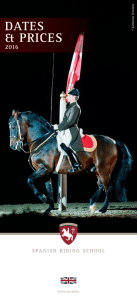ASIGNATURA / COURSE TITLE 1.1. Código / Course number 1.2
Anuncio
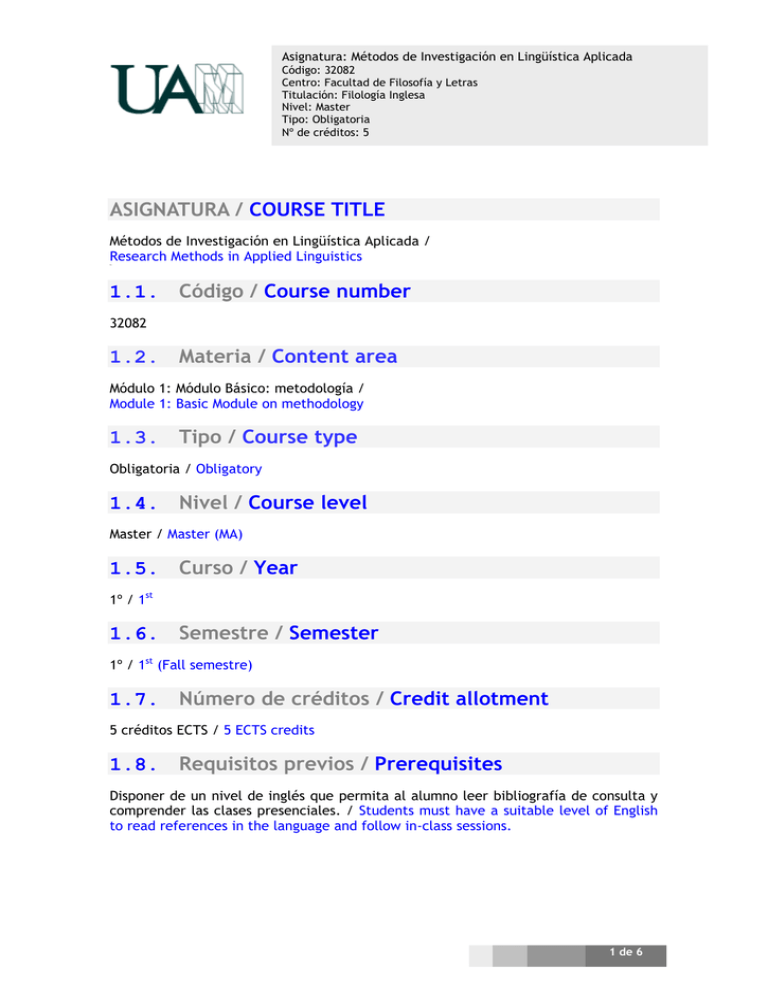
Asignatura: Métodos de Investigación en Lingüística Aplicada Código: 32082 Centro: Facultad de Filosofía y Letras Titulación: Filología Inglesa Nivel: Master Tipo: Obligatoria Nº de créditos: 5 ASIGNATURA / COURSE TITLE Métodos de Investigación en Lingüística Aplicada / Research Methods in Applied Linguistics Lee 1.1. Código / Course number 32082 1.2. Materia / Content area Módulo 1: Módulo Básico: metodología / Module 1: Basic Module on methodology 1.3. Tipo / Course type Obligatoria / Obligatory 1.4. Nivel / Course level Master / Master (MA) 1.5. Curso / Year 1º / 1st 1.6. Semestre / Semester 1º / 1st (Fall semestre) 1.7. Número de créditos / Credit allotment 5 créditos ECTS / 5 ECTS credits 1.8. Requisitos previos / Prerequisites Disponer de un nivel de inglés que permita al alumno leer bibliografía de consulta y comprender las clases presenciales. / Students must have a suitable level of English to read references in the language and follow in-class sessions. 1 de 6 Asignatura: Métodos de Investigación en Lingüística Aplicada Código: 32082 Centro: Facultad de Filosofía y Letras Titulación: Filología Inglesa Nivel: Master Tipo: Obligatoria Nº de créditos: 5 1.9. Requisitos mínimos de asistencia a las sesiones presenciales / Minimum attendance requirement La asistencia a las sesiones presenciales es obligatoria. / Attendance to contact sessions is mandatory. 1.10. Datos del equipo docente / Faculty data Docentes(s) / Lecturer(s): Jesús Romero Trillo Departamento de Filología Inglesa / Department of English Studies Facultad de Filosofía y Letras / School of Arts Despacho 102 (Módulo IV BIS) / Office 102 (Module IV BIS) 91-4978540 Correo electrónico / Email: [email protected] 1.11. Objetivos del curso / Course objectives a) Descripción / Description: By the end of this course, students should be able to perform applied linguistics research, including considered research design, ethical data collection, statistical analysis of the data, and professional reporting of the results in publishable format. The students will be provided with more specific instruction in the carrying out of a research study based on linguistic corpora. b) Competencias / Skills: In particular, the course will address the following ‘competencias’ provided in the ‘memoria de verificación’ of the degree: G6: G5: E8: E10: E13: Be capable of collecting and statistically analysing linguistic data from distinct sources and with distinct methodologies (questionnaires, experiments, corpora, databases, etc.) and know how to present the results in the form of charts, tables, etc. Be capable of critical reasoning, and know how to synthesise information and reach conclusions from a base of empirical evidence and logical argument, and also to develop skills for linguistic problem solving. Know the methods and characteristics of different approaches to corpus linguistics for the English language. Know how to utilise different instruments and methods of linguistic to analyse the English language and its varieties, and apply these analyses to communication, language consulting and translation. Be able to formulate and test hypotheses about problems of applied linguistics to reach testable conclusions. 2 de 6 Asignatura: Métodos de Investigación en Lingüística Aplicada Código: 32082 Centro: Facultad de Filosofía y Letras Titulación: Filología Inglesa Nivel: Master Tipo: Obligatoria Nº de créditos: 5 E15: To have an analytical attitude to linguistic evidence and show initiative in solving technical and procedural problems in the use of the scientific method. E20: Develop an ethical attitude towards the use of data and subjects involved in research studies, and towards the work of oneself and others. T1: Know the basis and development of the scientific method and academic procedure. 1.12. Contenidos del programa / Course contents 1- Constructing Research Designs: - Quantitative vs. Qualitative Research. Characteristics and validity. Types of data. Research questions, hypotheses, variables. 2- Quantitative Research: Simple numerical calculations. - Central tendency & distribution. Mode & Mean. Standard deviation. 3- Comparing groups and Describing relationships: - T-test, ANOVA, Correlations, etc.. 4- Introduction to Corpus Linguistics: - Principles of corpus design - Data collection 5- Practical Session in Corpus Analysis: - Exploration of large online corpora - Deriving statistics from an annotated corpus 3 de 6 Asignatura: Métodos de Investigación en Lingüística Aplicada Código: 32082 Centro: Facultad de Filosofía y Letras Titulación: Filología Inglesa Nivel: Master Tipo: Obligatoria Nº de créditos: 5 1.13. Referencias de consulta / Course bibliography BROWN, J. D. (1988). Understanding research in second language learning: A teacher's guide to statistics and research design. New York: Cambridge University Press. HATCH, E. & LAZARTON, A. (1991). The Research Manual: Design and Statistics for Applied Linguistics. Rowley, MA: Newbury House. MACKEY, A., & GASS, S. M. (2005). Second language research: Methodology and design. Mahwah, NJ: Erlbaum. PALTRIDGE, B. & PHAKITI, A. (2010). Continuum companion to research methods in applied linguistics. New York: Continuum ROMERO-TRILLO, J. (Ed.) (2008) Pragmatics and Corpus Linguistics: a Mutualistic Entente. Berlin/N.Y.: Mouton de Gruyter ROMERO-TRILLO, J. (Ed.) (2013) Yearbook of Corpus Linguistics and Pragmatics: New domains and methodologies. Dordrecht: Springer SINCLAIR, J. (2005). Corpus and Text: Basic Principles. Chapter 1 in M. Wynne (ed.) Developing Linguistic Corpora: a Guide to Good Practice. Oxford: Oxbow Books. Available online from: http://ota.ahds.ac.uk/documents/creating/dlc/chapter1.htm 2. Métodos docentes / Teaching methodology The teaching-learning methodology includes the following activities: A. Contact activities (six sessions of four hours of classes plus programmed tutorials): • Theoretical and practical classes: four-hour sessions in which the teacher presents the content of the course, and then the students applies these theoretical concepts in discussions, surveys, tasks, oral presentation, etc., to deepen their understanding of the issues. • Tutorial monitoring: programmed sessions to monitor student progress. • Seminars: seminars on various topics related to Applied Linguistics in English. • Online work: online tasks aimed at monitoring student progress, discussion forums, etc. (These are 'contact sessions’ in that these tasks will involve online interaction with between teacher and student). B. Non-contact activities: • Readings: guided reading of theoretical references. • Practical exercises: summaries, critical analysis of readings, to be discussed both in classes and online. 4 de 6 Asignatura: Métodos de Investigación en Lingüística Aplicada Código: 32082 Centro: Facultad de Filosofía y Letras Titulación: Filología Inglesa Nivel: Master Tipo: Obligatoria Nº de créditos: 5 • Preparation of final year assignment: working in teams/individually under teacher’s supervision (formulating a hypothesis, design, data collection and analysis, analysis, presentation of findings, citing references, publication …). CLASSES: Thursdays, October - November (see course timetable) 3. Tiempo de workload trabajo del estudiante Theory classes Programmed tutorials Contact Seminars Other: Online work (guided exercises, debate forum, etc.) Reading Practical exercises, summaries, critical analysis of Nonreadings, etc. contact preparation of final assignment Total Work Load: 25 Hours x 5 ECTS 4. / No. hours 20 h 8h 4h Student Percent 42 % = 52 hours 20 h 18 h 13 h 58 % = 73 hours 42 h 125 h Métodos de evaluación y porcentaje en la calificación final / Evaluation procedures and weight of components in the final grade There will be no exam for the course. Evaluation will be based on the completion of three written assignments: Assignment 1: Essay on a scientific topic: Assignment 2: Critique of two research studies Assignment 3: Design and completion of statistical study: 20% 40% 40% 5 de 6 Asignatura: Métodos de Investigación en Lingüística Aplicada Código: 32082 Centro: Facultad de Filosofía y Letras Titulación: Filología Inglesa Nivel: Master Tipo: Obligatoria Nº de créditos: 5 5. Cronograma* / Course calendar Semana Week Contenido Contents Docente Lecturer Horas presenciales Contact hours Horas no presenciales Independent study time 1 Constructing Research Designs Romero Lectures: 4 hrs Online work: 3 hrs 2 Quantitative Research: Simple numerical calculations Comparing groups & Describing Relationships I Romero 4 Comparing groups & Describing Relationships II Romero Lectures: 4 hrs Programmed Tutorial: 1hr Online work: 3 hrs Lectures: 4 hrs Programmed Tutorial: 1hr Online work: 3 hrs Lectures: 4 hrs Online work: 3 hrs Reading: 2hrs Exercises 3 hrs Preparation Assign. 1: 10 hrs Reading: 2hrs Exercises 3 hrs 5 Introduction to Corpus Linguistics: practical applications Presenting Research Romero 3 6 Romero Romero Lectures: 4 hrs Programmed Tutorial: 1hr Online work: 3 hrs Seminar: 4 hrs Programmed Tutorial: 1hr Online work: 3 hrs Reading: 2hrs Exercises 3 hrs Preparation Assign. 2: 8 Reading: 2hrs Exercises 3 hrs Preparation Assign. 2: 8 Reading: 2hrs Exercises 2 hrs Preparation Assign. 3: 9 Reading: 2hrs Exercises: 3 hrs Preparation Assign. 3: 9 6 de 6 hrs hrs hrs hrs
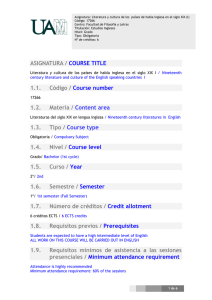
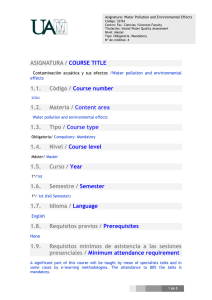
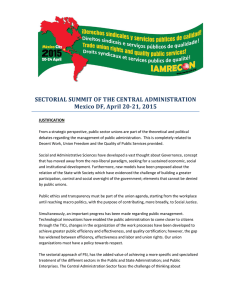
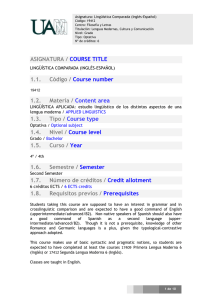
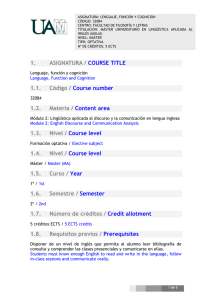
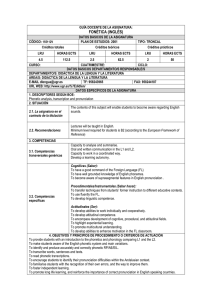
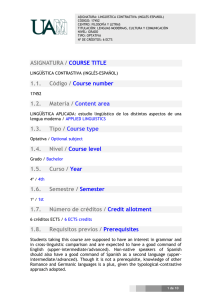
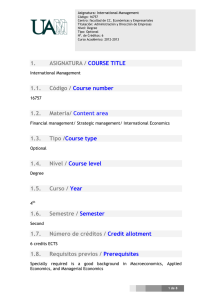
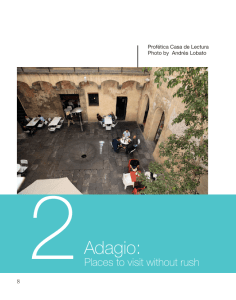
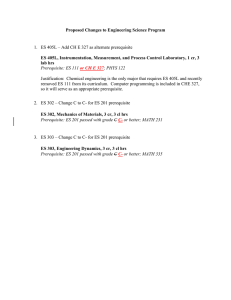
![public class suma { public static void main (String [] args](http://s2.studylib.es/store/data/005978644_1-aadbfee34d766827a46ec486c2602c50-300x300.png)
